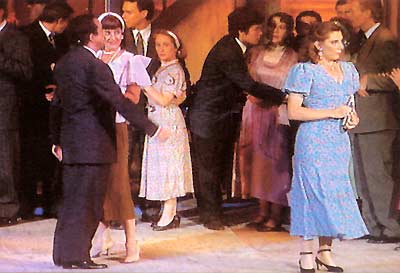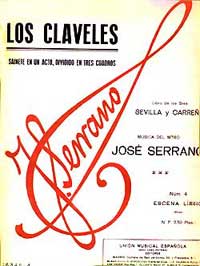 |
Los Claveles |
|
This material is © Christopher Webber, Blackheath, London, UK. Last updated July 2nd 2001 |
|
®
recommended
recording By 1929 the long operetta-style zarzuela and short revista between them had come to dominate Madrid's theatrical life. So when Sevilla and Carreño dedicated their one-act sainete madrileño Los Claveles (Teatro Fontalba, Madrid, 6th April 1929) to the city itself, their words sounded as a nostalgic echo, a conscious tribute to the lost Golden Age of zarzuela: |
|
"A ¡Madrid! que es, a un tiempo, campo de lucha y tierra hospitalaria. A ¡Madrid! que sabe tener para el extraño grato calor de patria chica." ("To Madrid, at once a field of battle and hospitable ground. To Madrid, which knows how to provide for the stranger the pleasing warmth of a dear homeland.")
Los Claveles, however, is more than a throwback to the old, urban genéro chico. Its up-to-date manners, language and setting, and its ordinary working characters, provided a template for a contemporary style which was only broken with the outbreak of the Civil War. Other major composers were quick to take up the 'retro' fashion, but Los Claveles has been particularly associated with La del manojo de rosas (Sorozábal, 1934) and Me llaman la Presumida (Alonso, 1936) - both to texts by Carreño himself and Castro - as the first part of an unofficial "Madrid Trilogy" of classic mid-20th century zarzuelas.
Los Claveles survives, of course, because it inspired some of Serrano's latest and best music. The ageing composer's instinct for theatrical novelty was as strong as ever, though the popular jazz influences absorbed by Sorozábal and Alonso have no place in his score. Serrano's six numbers in direct, melodic style had no need to bend to fashion. He takes his romantic lovers and their tangled emotions seriously; and in his sympathetic hands farcical figures - in particular the woman embittered by the understandable feeling that she is better than everyone else around her - become living and breathing human beings. There is surely no more intensely felt romanza in the repertoire than Rosa's "¿Qué te importa que no venga?", and the contrast between this and Fernando's light but bitter dismissal of women ("¡Mujeres!") is superbly judged. The three duets are on a comparable level, and altogether Los Claveles remains one of Serrano's most touching and theatrically subtle creations.
![]() Scene 1 -
The shop floor of the perfume factory "Los Claveles" (Carnations) in
Madrid. The workers, including Jacinta, Paca and their overseer Rosa,
gossip as they sit labelling bottles and parcelling cakes of soap. Goro, the
junior accounts clerk in love with Jacinta, rubs out figures to give himself an
excuse to spend longer with the working girls (Escena: "Anímate, Irene, que el negocio es
bueno".)
Scene 1 -
The shop floor of the perfume factory "Los Claveles" (Carnations) in
Madrid. The workers, including Jacinta, Paca and their overseer Rosa,
gossip as they sit labelling bottles and parcelling cakes of soap. Goro, the
junior accounts clerk in love with Jacinta, rubs out figures to give himself an
excuse to spend longer with the working girls (Escena: "Anímate, Irene, que el negocio es
bueno".)
It's the lunch break, and as the girls prepare to disappear off into town Jacinta and Paca tease Rosa about her apparent interest in the new cashier, Fernando, who is every bit as proud as she herself. Rosa vehemently dismisses the suggestion, greeting the young man with pointed contempt as he appears on the floor, and vowing to prove her point by humiliating him in some way. Fernando privately asks the janitor, Goro's mother Señá Remedios, to direct any young lady visitor he may have through to his office. When Remedios hints that Rosa ought to be quick and make a move for him, she's rewarded by a taste of the young woman's sharp tongue before the overseer hurries off after the other girls.
When Remedios hears from Braulio, Goro's boss, that her son is making a lot of mistakes, she tackles the young man about his slackness. Then Jacinta's uncle, Bienvenido, arrives bringing his niece's lunch. He spices his compliments to Remedios with witty classical allusions, but his real motive is more sinister. Reminding the janitor about the supposed infidelity of her husband Evaristo, he tempts her to move out and live with him instead. Their conversation is interrupted by Evaristo's arrival, and when Remedios retires into her janitor's booth her husband - who works in a butcher's shop - passes a parcel of liver over to the other man. The duplicitous Bienvenido is simultaneously seducing the wife, blackmailing the husband for another supposed indiscretion many years ago, and demanding kidneys for lunch tomorrow into the bargain!
The men leave, and Jacinta sneaks back to meet Goro. They sing a comic duet (Dueto Cómico: "Goro del alma, ven junto a mí") full of flirtatious banter, before being interrupted by Evaristo. When he hears that they are engaged, he flies into a mysterious passion and forbids them to have anything more to do with one another. Remedios, hearing the commotion, takes the side of the youngsters and sends them all about their business, though Evaristo remains implacable. Fernando comes in to find Jacinta still in tears. He comforts her and promises to intercede on her behalf. In return she warns the grateful cashier of Rosa's intention to bring him down a peg or two. He vows to take care that the boot will be on the other foot.
The girls return, and Rosa launches into a blistering verbal attack on Fernando. The workers and office staff - even including the venerable manager of the business, Don Facundo - listen spellbound to the exchange (Dúo y scena: "Tenga muy buenas tardes".) Fernando's sincere admiration for Rosa's beauty is answered with scorn, especially when his young lady friend calls for him. Turning at the door, he gently reproves Rosa, intimating that pride may come before a fall ("Cuando un hombre de bien") but she laughs in his face, and he leaves amidst the mocking sound of the workers' laughter. Rosa, strangely unappeased, swears to get back at him, and as the factory bell rings everyone settles back to work.
![]() Scene 2 -
Outside a bar in the downtown Plaza de la Cruz Verde, afternoon. Braulio
and a friend try to get a drink and some tapas, but the waiter of the hopeless
local bar has nothing to offer them. They depart in high dudgeon as Rosa comes
in with Paca. She has finally agreed to Fernando's repeated pleas to meet with
her after work, and though she tells Paca that she only means to take the
opportunity to mock him again, it's obvious to the younger girl that Rosa is
worried by his lateness. Paca warns Rosa that Fernando has been seen around
with another woman, and goes off home, leaving Rosa to a series of bad-tempered
exchanges with the useless bartender as she waits with increasing
impatience.
Scene 2 -
Outside a bar in the downtown Plaza de la Cruz Verde, afternoon. Braulio
and a friend try to get a drink and some tapas, but the waiter of the hopeless
local bar has nothing to offer them. They depart in high dudgeon as Rosa comes
in with Paca. She has finally agreed to Fernando's repeated pleas to meet with
her after work, and though she tells Paca that she only means to take the
opportunity to mock him again, it's obvious to the younger girl that Rosa is
worried by his lateness. Paca warns Rosa that Fernando has been seen around
with another woman, and goes off home, leaving Rosa to a series of bad-tempered
exchanges with the useless bartender as she waits with increasing
impatience.
|
Remedios and Goro enter the plaza. The youngster is shell-shocked from the interview with his father, and convinced that the marriage is impossible. His mother, in a bad mood herself, tells Rosa that she saw Fernando getting into a taxi with another woman - his sister, says Rosa, but Remedios spitefully tells her that it was a waitress from a fashionable restaurant. After a further exchange of taunts between the two women, Remedios and Goro leave Rosa alone. She reveals her complex unhappiness in the great Romanza: "¿Qué te importa que no venga?". The depth of her feeling makes her angry with herself, and she faces up to the fact that she cares for Fernando much more than she cares to admit. When she sees him arrive, she prepares to give him a piece of her mind. But he is with the other girl, and doesn't even look at her. Cursing her fate, Rosa leaves in floods of tears. |
|
Bienvenido enters the plaza with Remedios and the despairing Goro. Once he has packed the young man off, he again presses Remedios to live with him, in return for which he promises to smooth the way for Goro's marriage with Jacinta. Goro runs on in turmoil, having seen Jacinta coming their way. His badly feigned indifference upsets the girl, and when Evaristo appears Remedios threatens to leave him there and then unless he gives way over his son's marriage. Evaristo appeals to Bienvenido for help, but that worthy's advice is simply: "rent a bedsit." Once the other men have gone, Goro tells the women that his father has confessed the truth - Jacinta is his own daughter, and therefore Goro's half sister. Remedios counters this on the spur of the moment by declaring that Evaristo may indeed be Jacinta's father, but that Goro's real father is now living in Barcelona! The young pair, for the moment, are relieved and happy at the news. An orchestral Intermedio, based on themes from the finale of Scene 1, leads to the last scene.
![]() Scene 3 -
Outside the Goya church of San Antonio de Florida. Goro is enjoying a
picnic with Jacinta, whilst his mother is apparently succumbing to Bienvenido's
flattery, although privately she still doubts his sincerity. Fernando appears,
reading a note from Rosa, who has finally agreed to meet him. He sings of the
fickle affections of women in another fine Romanza: "¡Mujeres!".
Scene 3 -
Outside the Goya church of San Antonio de Florida. Goro is enjoying a
picnic with Jacinta, whilst his mother is apparently succumbing to Bienvenido's
flattery, although privately she still doubts his sincerity. Fernando appears,
reading a note from Rosa, who has finally agreed to meet him. He sings of the
fickle affections of women in another fine Romanza: "¡Mujeres!".
Evaristo, by now at his wits' end, appeals to Fernando to help him sort out the marital mess he has got himself into. The alleged recent affair is a fiction, but his wife will not believe it. Fernando agrees, and Evaristo leaves to fetch his wife and son. Before they return, Rosa has arrived with Paca, who advises her friend to drop her mocking stance, before tactfully leaving the pair together. In a passionate duet, they admit their love, only for Fernando to spoil the moment by telling Rosa that he is married (Dúo: "¿Por qué vuelve la cara?".) Rosa, weeping, rushes into the church, and Fernando leaves quietly.
Evaristo returns with Remedios, Goro, Jacinta and Bienvenido. Now the truth emerges: Evaristo is not Jacinta's father at all, though Bienvendio has been using the rumour to get free lunches out of the poor man. Remedios is free to admit that Goro really is Evaristo's son after all, and Bienvenido - shown up as a lecherous liar and cheat - takes to his heels. Remedios and Evaristo are happily reunited, and their son Goro can finally look forward to marriage with his beloved Jacinta. Finally, Fernando admits to Rosa that he has been getting back at her for mocking his marital pretensions. They generously forgive one another, and all ends happily as the curtain falls to a few bars from Rosa's romanza.

